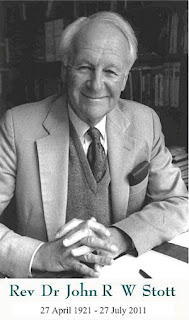Preacher
Stott was renowned as a preacher, writer and Evangelical leader. I only once heard him preach. I had just begun my studies at the London Theological Seminary in October 1988. On the first Sunday of my time in London I headed off to Westminster Chapel for the morning service. R. T. Kendall was the Minister back then. My attendance at the Chapel was probably more of a homage to D. Martyn Lloyd-Jones, than a desire to hear RT, but there we are. In the evening I went to All Souls, hoping that John Stott would be preaching, and he was. I can't remember his text, but more than twenty years later I can still recall the gracious authority with which he preached. The thrust of his message was that Jesus welcomes all who will come to him, whatever their social status, gender etc. After the service I joined the queue of people who lined up to speak to him. I told him that I was studying at LTS and that I came from Wales. In his rather posh accent, he said, "Ah, from the Principality!" and indicated that he had a place in Wales. This bothered me at the time, as I wasn't keen on the English having holiday homes in the Land of my Fathers.
Stott helped to spearhead the recovery of expository preaching amongst Evangelical Anglicans. He did for gospel men in the Church of England what Lloyd-Jones was doing for Nonconformists. He was a gifted preacher of the Word and faithful pastor of God's flock at All Souls. He could have become a Church of England bishop, but he preferred to devote himself to his ministry of preaching and writing.
Writer
I can't recall how many books by John Stott I have read. But two of the most influential titles for me as a young believer with a burgeoning interest in theology were by Evangelical Anglicans, Knowing God by Jim Packer and The Cross of Christ, by John Stott. Stott's work on the cross was his magnum opus, a masterly exposition and defence of the biblical teaching on the atoning death of Christ. Stott's many commentaries in the Tyndale and Bible Speaks Today series have enriched my preaching ministry. His exegetical skill, theological nous and thoughtful application of the biblical text are often just what the pastor needs in sermon preparation.
Leader
As a leader, Stott helped to stimulate Evangelicals to think about the application of biblical truth to the public square, founding the London Institute for Contemporary Christianity. On the international stage, he was influential in the Lausanne Movement for World Evangelisation. Controversially Stott clashed with D. Martyn Lloyd-Jones at the 1966 Evangelical Alliance meeting on Evangelical Unity (see here). Stott used his position as chairman to urge delegates not to follow the Welsh preacher's call for Evangelicals to leave their denominations and come together as a fellowship of Evangelical churches. At the 1967 National Evangelical Anglican Conference at Keele, Stott argued that integration rather than separation was the way ahead for Evangelical Anglicans. This ecumenical trend was given further impetus with the 1977 Nottingham Statement of the NEAC, which declared "Seeing ourselves and Roman Catholics as fellow-Christians, we repent of attitudes that have seemed to deny it." (Section M). Stott caused some justifiable consternation in the Evangelical world when he cautiously espoused conditional immortality rather than the eternal conscious punishment of the wicked in Essentials, a dialogue with the liberal theologian David Edwards.
Stott's misguided policy of Evangelical integration and his dalliance with conditional immortality are a reminder that great, gifted and godly men are not infallible. However, Evangelicals in the UK and beyond have reason to thank God for the preaching, writing and leadership of John R. W. Stott. I certainly do.

3 comments:
I agree with your tribute but I think that the Nottingham Statement of 1977 deserves a mention among the cautions, especially the section on Rome.
Jonathan is right: the Nottingham Statement marked a watershed, and it was a denial of evangelical truth.
I do value one memory of John Stott. He came to speak to our tiny Christian Union and in the course of his talk told us "... to be anti-intellectual is not simply sub-Christian. It is sub-human." (Cue apoplexy among the charismatics.)
I don't think he 'exposed' conditional immortality as you say. Unhappily, he espoused it.
I've added something on Nottingham and corrected the typo Ben spotted.
Post a Comment